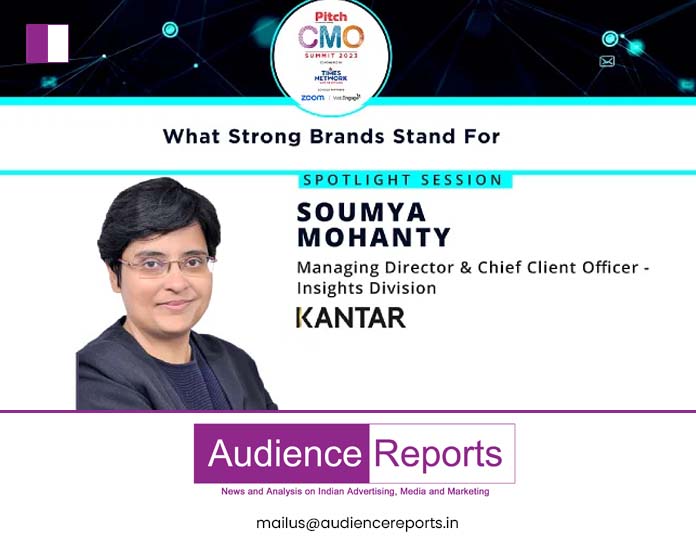At the Pitch CMO Summit, Delhi, Mohanty, MD & Chief Client Officer – Insights Division, Kantar, spoke about brand purpose and what it means in a world that has been amplified by technology
In a spotlight session at the Pitch CMO Summit in Delhi, Soumya Mohanty, Managing Director & Chief Client Officer – Insights Division, Kantar, spoke about how marketers believe that they get all the insights on their own when monitoring social media or visiting a few retailers. This is a key reason why India is one of the least penetrated markets in terms of consumer insights, Mohanty rued.
“If you look at the ratio of GDP to marketing and advertising budgets, it would also probably be on the lower side. We need to do a lot more on data-based decision-making that tends to grow advertising and marketing and we probably don’t do much in investing and understanding consumer data at scale.”
While speaking about purpose and what it means in the world which has been amplified by technology, Mohanty said that our world is different today. “We have had wars, we have had supply chain disruptions and unprecedented levels of inflation. Maybe to some extent, India has remained a little insulated, but we are seeing recovery, which is moderate and Bharat and urban India moving at a different pace. “Volume recovery has still not happened. Its value on which most of the FMCG companies are still riding on so there is a lot of uncertainty and in that environment, in which the consumer is also facing a lot of ambiguity and can brands really stand by,” asked Mohanty.
Sharing insights from the Kantar BrandZ report, she said, “We found that purpose-driven companies tend to over-perform on financial outcome metrics. Now this is as evaluated by the companies themselves but if we also looked at consumer data, and this data comes from Kantar BrandZ, which is the world’s largest brand-building database that exists. This data also supports the fact that if consumers believe that you have a purpose, your brand valuation tends to be higher and there is a 175% higher growth in 12-year brand value.”
She further added that if consumers believe that your company actually has a purpose in an era, which is completely disruptive with digital innovation, hyperlocal marketing and value perceptions change sustainability. “I think this is as strong data as you can get.”
Last year we again found that there is about a 62% valuation growth in brands where consumers endorse what they know and understand what the brand’s purpose is.”
According to Mohanty, purpose simply is the reason why your brand exists and it is the impact that you seek to have in the lives of your consumers. So, it is not necessarily about doing something for a social cause. It can just be delivering excellent high quality, consistent service. It can just be about high-quality products that make life simpler, as long as we are clear on that and as long as that is consistently felt by our consumers, they will believe that the brand has a purpose, she remarked.
Last year, Kantar felicitated TATA Tea as the most purposeful brand of the year for what they believe is communication-led purpose.
Speaking further about what technology has really changed for brands, Mohanty shared four things that have changed. The first is that it has bought in a lot of new influencers. “Indians in general compared to the global average have way higher chances on being influenced by influencers as claimed by them. So, this comes from a global study that we do. It’s called Global Issues Monitor and consistently we find that Indians believe and trust influencers on social media a lot more than global counterparts. And that’s why you have not faced the kind of big technology backlash that’s happening across the world till now.”
The other thing is that through social media she shared that people can express themselves anonymously which is again higher than the global average. “So not only do we follow influencers and get influenced by them, but we also love to express ourselves a lot more and influence brand narratives to that extent. And that means for brands, consumers on your brands now, it’s not a one-way dialogue anymore. Its consumers are feeding you back real-time.”
According to Mohanty, purpose can be manifested as purpose as a commitment, as a product, as experience and as a communication.
“The basics of brand building are still the same. So, brands even when they are built on social media, direct-to-consumer brands and digital-first brands are also fundamentally brands, that consumers have to know you, they have to feel what you’re offering to them is relevant and you have to stand out from your other competitors. So as long as they are convinced that they are getting what they want, they believe the brand is living up to its purpose. A brand with purpose is a brand with meaning but meaning for your consumers.”






































